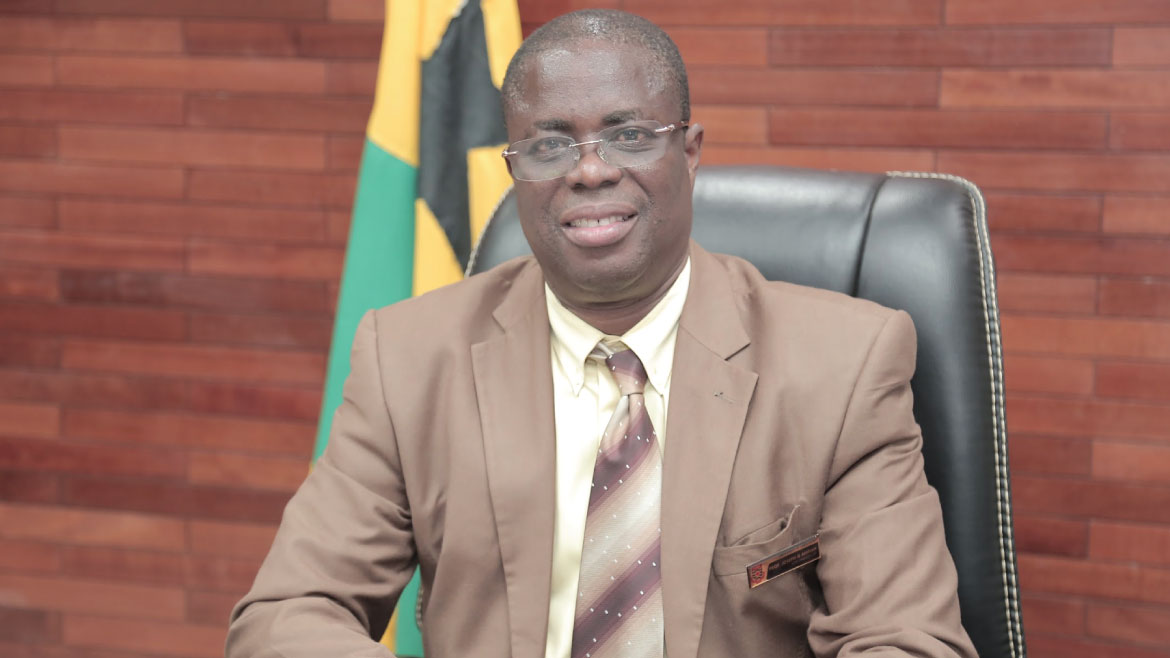Mr. John Kpodo has been sworn in as the new Students Representative Council President (SRC) to take over from Mr. Tony Henry Arthur, who headed the Council during the 2017/18 academic year.
Mr. Kpodo, a level 300 student reading B.ED Science, polled 3,574 of the vote to beat Mr. Kinglsey Sarpong Akowuah, a second year law student, who is challenging the outcome of the elections through the laid down procedures of the University.
The Registrar, Mr. John Kofi Nyan, in accordance with the Statutes of the University administered the oath of office and allegiance to Mr. John Kpodo and other elected executives.
In his inaugural address, Mr. Kpodo called for unity amongst the executives in the discharge of their responsibilities. He called on management to automate students’ portals to enable them pay 50 per cent of the school fees to facilitate registration of their courses.
Mr. Kpodo, who is a professional teacher, asked for improved security on campus and called for the recruitment of competent security officers to beef up the existing security arrangements. He pleaded with students to respect the rules and regulations of the University, saying: “Without discipline, we cannot move forward”.
The new SRC president called on board candidates who contested with him to support his administration with their rich experiences to move the SRC in the right direction. He thanked his predecessor for his significant contributions to the welfare of students and promised to champion the welfare and interest of the student body. He called for a roundtable discussion with management to address pressing issues affecting students.
For his part, the immediate past president, Mr. Tony Henry Arthur, expressed gratitude to students for giving him the opportunity to serve them for one-academic year. He thanked the Vice-Chancellor for his availability and assertive leadership.
Mr. Arthur advised his successor to create opportunities and initiatives and also consult his predecessors on burning issues, adding that “but it is not automatic to enjoy what your predecessor enjoyed.”
In his address, the Vice-Chancellor, Prof. Joseph Ghartey Ampiah, urged the student leaders to work closely with University management to bring about meaningful change to students’ life. “All you need to do to achieve this is to apprise yourselves of the operations and activities of the University,” he said, while congratulating them on their election and inauguration.
To this end, the Vice-Chancellor said the Office of the Dean of Students’ Affairs would organise a workshop for student leaders to be abreast of the operations of the University, to make their work easy while in office.
The Vice-Chancellor announced that canteen fees, which was a component of the academic facility user fees, had been scrapped. He assured the students that plans were far advanced to streamline the activities of the shuttle system on campus, to make it more convenient.
Prof. Ampiah told the new officers that his management was always open to dialogue on pressing issues affecting students on campus. He advised them to work as a team in order to achieve their vision and mission as student leaders.
He said:” Being a leader does not mean that you wait for people to come to you - it is the opposite”. He however reminded the student leaders that not all their election promises might be workable or practicable and, therefore, advised them to look for practical and measurable solutions to students’ problems and challenges.
Prof. Ampiah challenged them to take their studies seriously and advised the new executives to use their time wisely in the execution of their mandate. He prayed for God’s guidance, wisdom, good health, knowledge and understanding for the new executives.
The other elected officers who were sworn into office were Yvonne Ashong, Vice-President; Emmanuel Mensah, Treasurer; Kumba Tamba, Secretary; Latif Lawrence Joehowie, Public Relations Officer; Edith Baafi, Coordinating Secretary, and Osei Dennis Agyin, Sports Secretary.
The executives of the Local National Union of Ghana Students (NUGS), who were also sworn into office, were Acquah Ebo Mensah, President; Gifty Mensah, Secretary, and Faustina Maama, Women’s Commissioner.


